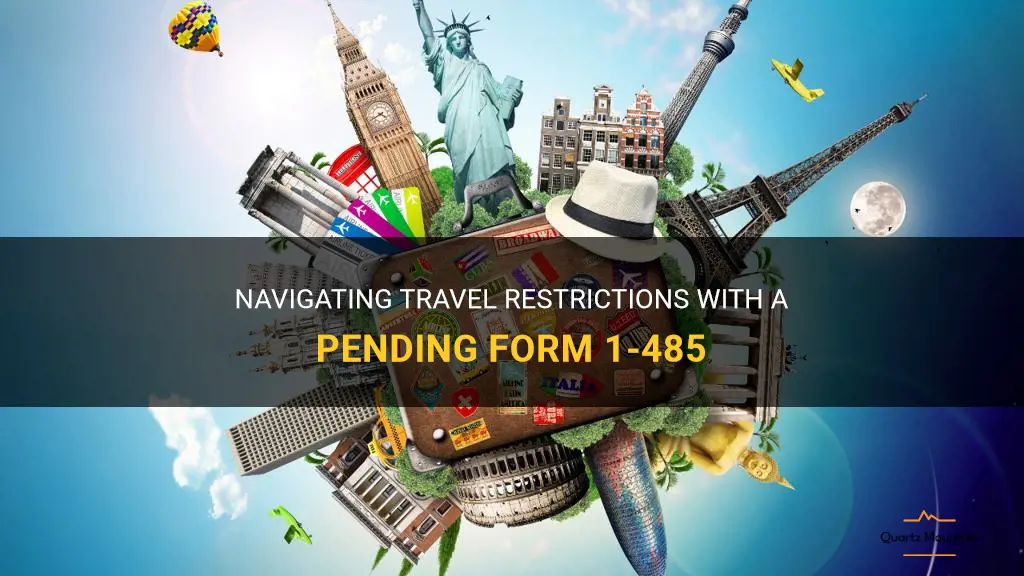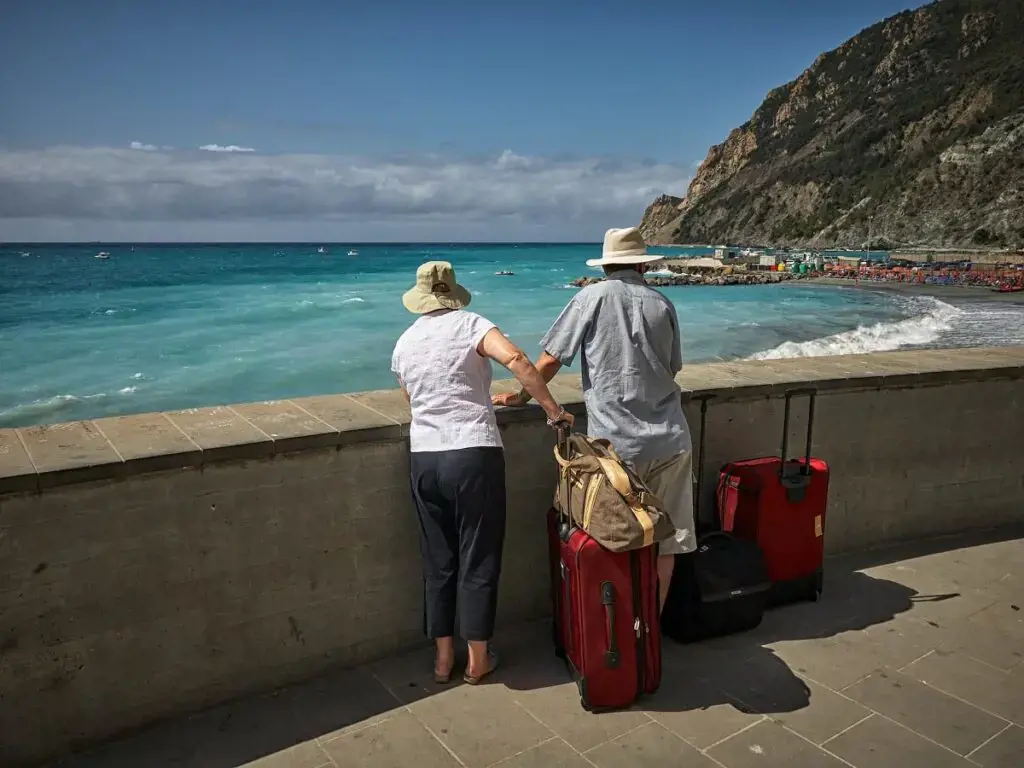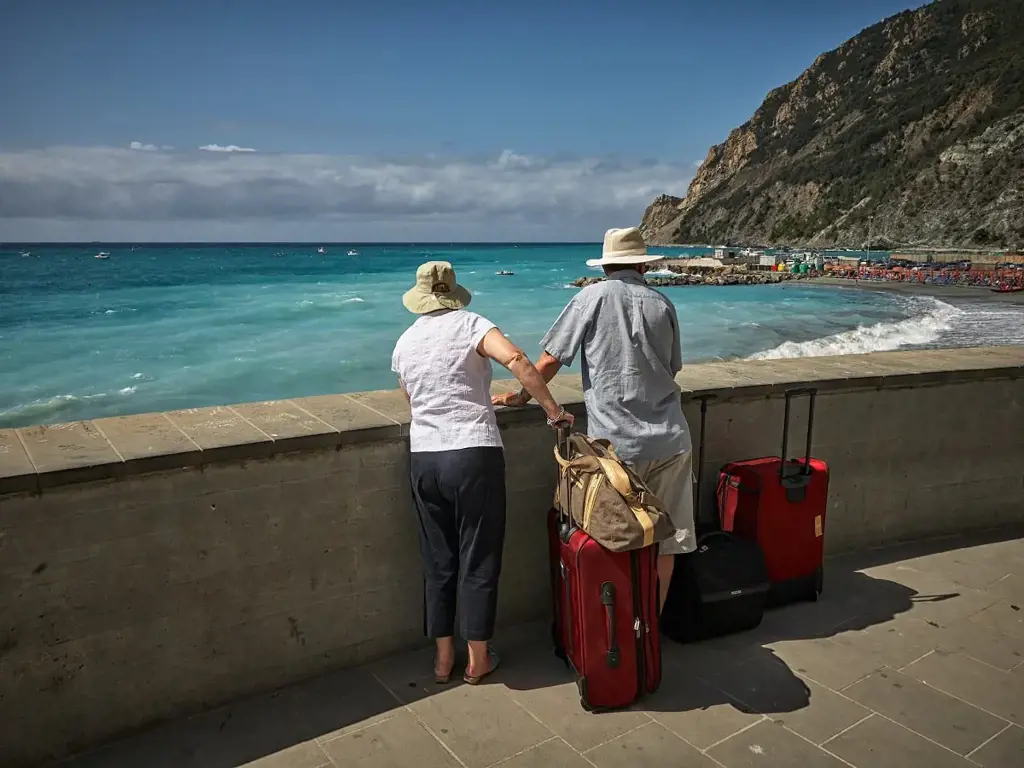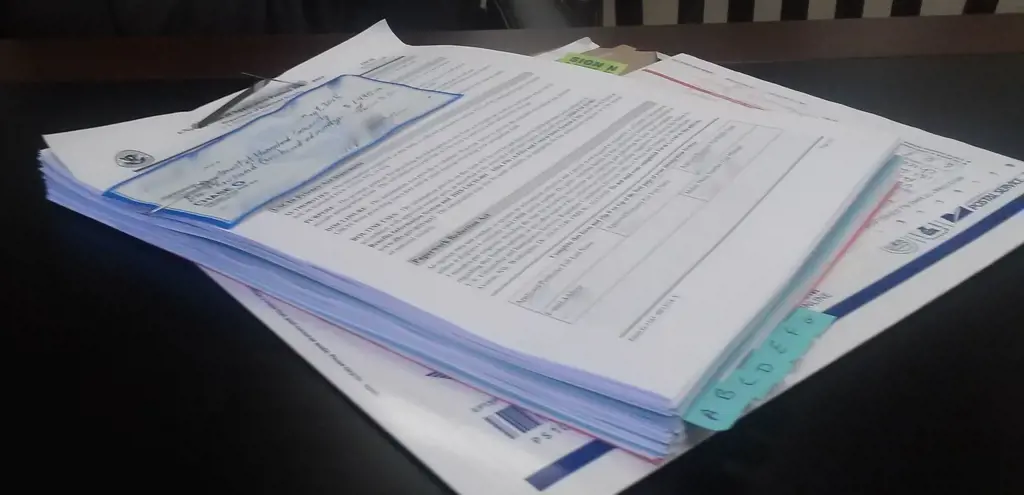
Are you eagerly awaiting the approval of your Form I-485, Application to Register Permanent Residence or Adjust Status? If so, you may be wondering what travel restrictions you need to be aware of while your application is pending. In this article, we will explore the limitations and considerations for traveling while your Form I-485 is awaiting approval. So, grab your passport and let's embark on a journey to understanding travel restrictions for pending Form I-485 applicants.
What You'll Learn
- How does having an I-485 application pending affect travel restrictions?
- Are there any travel restrictions for individuals with a pending I-485 application?
- Can I leave the country if my I-485 application is pending?
- What are the consequences of traveling while my I-485 application is pending?
- Is there a way to request an exception or waiver for travel restrictions if my I-485 application is pending?

How does having an I-485 application pending affect travel restrictions?

If you are in the process of applying for permanent residency in the United States and have submitted an I-485 application, you may be wondering how this could affect your ability to travel. Understanding the travel restrictions during the pendency of an I-485 application is crucial to avoid any potential issues or delays in the immigration process.
The I-485 application, also known as the Application to Register Permanent Residence or Adjust Status, is used by individuals who are already in the United States and wish to become a lawful permanent resident. This application is typically filed concurrently with other immigration petitions, such as an I-130 petition for alien relative or an I-140 petition for immigrant worker.
Once the I-485 application is filed, there are certain travel restrictions that come into play. These restrictions are in place to ensure that individuals do not abuse the immigration process by filing for adjustment of status and then leaving the country without receiving a decision on their application.
The primary travel restriction during the pendency of an I-485 application is known as the "Advance Parole" requirement. Advance Parole is a travel document that allows individuals with pending I-485 applications to travel outside the United States and then re-enter without abandoning their application. Without Advance Parole, leaving the country before the I-485 is approved or denied could result in the application being deemed abandoned.
To obtain Advance Parole, applicants must file Form I-131, Application for Travel Document, along with supporting documentation and the required filing fee. It is important to file this form and receive approval before traveling outside the United States. Failure to obtain Advance Parole and leaving the country could have serious consequences, including the denial of the I-485 application.
Additionally, even with Advance Parole, travel may still be restricted for individuals with certain immigration statuses. For example, individuals who are in the United States on certain nonimmigrant visas may be subject to travel restrictions imposed by those visas. It is important to carefully review the terms of your visa and consult with an immigration attorney before making any travel plans.
In some cases, individuals may be eligible for an expedited travel document known as "emergency Advance Parole." This can be requested if there is a genuine emergency or humanitarian reason for travel, such as a serious illness or death in the family. However, emergency Advance Parole is only granted in limited circumstances and is subject to approval by U.S. Citizenship and Immigration Services (USCIS).
It is also important to note that even with Advance Parole, there is still a risk of the I-485 application being denied or encountering other issues upon re-entry to the United States. It is crucial to have all necessary documentation and be prepared for potential questioning by Customs and Border Protection (CBP) officers upon re-entry.
In conclusion, having an I-485 application pending can affect your ability to travel outside the United States. It is important to understand the travel restrictions and requirements for obtaining Advance Parole before making any travel plans. Consult with an immigration attorney to ensure that you comply with all necessary procedures and avoid any potential issues or delays in the immigration process.

Are there any travel restrictions for individuals with a pending I-485 application?

If you have a pending I-485 application, which is an application to adjust your status to a permanent resident in the United States, you might be wondering if there are any travel restrictions you need to be aware of. The answer to this question depends on your specific situation and the stage of your application process.
Generally speaking, individuals with a pending I-485 application are allowed to travel abroad. However, there are a few important factors to consider:
- Advance Parole: If you have applied for and received an Advance Parole document (Form I-131), you are allowed to travel internationally while your I-485 application is pending. The Advance Parole document serves as a re-entry permit, allowing you to return to the United States after your trip. It is essential to obtain Advance Parole before traveling, as traveling without it could result in the abandonment of your I-485 application.
- Consular Processing: If you are going through consular processing for your permanent residency, rather than adjusting your status within the United States, traveling abroad might not be possible. Consular processing requires you to attend an interview at a U.S. embassy or consulate in your home country to complete the immigration process. In this case, leaving the United States while your application is pending could result in the denial of your application.
- Public Charge Rule: It is also important to consider the potential impact of the Public Charge rule on your I-485 application. Under this rule, applicants who are deemed likely to become a public charge (relying on government benefits) can be denied a green card. If you travel abroad and require financial assistance during your trip, it could raise concerns about your ability to support yourself and potentially affect the outcome of your application.
- COVID-19 Travel Restrictions: In light of the ongoing COVID-19 pandemic, there are additional travel restrictions and considerations to keep in mind. The U.S. government has imposed various travel bans and entry restrictions for individuals coming from certain countries or regions with high COVID-19 transmission rates. It is essential to stay informed about the latest travel advisories and restrictions before planning any international trips.
To ensure a smooth travel experience and avoid any complications with your I-485 application, it is highly recommended to consult with an immigration attorney or qualified immigration professional before making any travel plans. They will be able to evaluate your specific circumstances and provide guidance based on the most up-to-date immigration laws and regulations.
In conclusion, individuals with a pending I-485 application can generally travel abroad if they have obtained an Advance Parole document. However, there are exceptions for those going through consular processing, and additional considerations related to the Public Charge rule and COVID-19 travel restrictions. Seeking professional advice is crucial to navigating these complexities and minimizing any potential risks to your application.
Understanding the Latest Travel Restrictions at the Spanish Embassy
You may want to see also

Can I leave the country if my I-485 application is pending?

If you have filed an I-485 application and are awaiting a decision on your adjustment of status, you may be wondering if you are allowed to leave the country. It is perfectly understandable to have travel plans or family events that require you to leave, but it is important to understand the implications of leaving while your I-485 application is pending.
In most cases, leaving the country while your I-485 application is pending will result in the abandonment of your application. This means that your application will be denied, and you will not be able to obtain a green card or permanent resident status through the adjustment of status process. However, there are certain situations where you may be able to leave the country without abandoning your application.
Advance Parole:
One way to maintain your pending I-485 application while leaving the country is by obtaining advance parole. Advance parole is a travel document issued by U.S. Citizenship and Immigration Services (USCIS) that allows certain foreign nationals with pending immigration applications to travel abroad and reenter the United States without abandoning their applications. To obtain advance parole, you must file Form I-131, Application for Travel Document, and pay the required fee.
It is important to note that advance parole is not guaranteed, and USCIS has the discretion to deny your application. Therefore, it is recommended that you consult with an experienced immigration attorney before making any travel plans and applying for advance parole.
Emergency Travel:
In certain cases, you may be able to leave the country for emergency travel without obtaining advance parole. USCIS understands that unforeseen circumstances may arise that require immediate travel, such as a serious illness or death of a family member. If you find yourself in such a situation, it is important to contact USCIS for guidance and make sure to document the emergency situation.
If you leave the country without advance parole for emergency travel, it is recommended that you notify USCIS as soon as possible and provide documentation of the emergency situation upon your return to the United States. This will help establish the genuine nature of your travel and may prevent the abandonment of your I-485 application.
Proceed with Caution:
While it is possible to leave the country while your I-485 application is pending, it is important to proceed with caution. The safest option is to obtain advance parole before traveling. This will ensure that your application remains active and you can reenter the United States without any issues. If you must leave for an emergency, make sure to contact USCIS and document the situation to minimize the risk of your application being denied.
Leaving the country while your I-485 application is pending can be a risky move, as it may result in the abandonment of your application. However, there are certain circumstances where you may be able to travel without abandoning your application. Obtaining advance parole is the best option to ensure the continued processing of your I-485 application. In cases of emergency travel, it is important to notify USCIS and provide documentation to support the emergency situation. It is recommended to consult with an experienced immigration attorney before making any travel plans to understand the potential implications for your specific case.
Exploring the Travel Restrictions and Guidelines in Billings, Montana
You may want to see also

What are the consequences of traveling while my I-485 application is pending?

The consequences of traveling while your I-485 application is pending can be significant. It is important to understand the potential risks and take necessary precautions before making any travel plans.
One of the primary concerns when traveling while your I-485 application is pending is the potential for abandonment of your application. If you leave the country while your application is still pending, it could be considered as a voluntary abandonment of your application. This means that your application will be denied and you may not be able to reapply for the same benefits.
It is important to note that there are limited exceptions to this rule. If you have a valid Advance Parole document, also known as a travel document, you may be able to travel without abandoning your application. However, it is essential to ensure that your Advance Parole document is valid, and you meet all the requirements for using it. If you do not have a valid Advance Parole document or if you do not meet the requirements, it is strongly advised to avoid traveling until your application is approved.
In addition to the risk of abandonment, traveling while your I-485 application is pending can also result in complications and delays in the processing of your application. USCIS may require additional evidence or documentation to verify your travel history, which can lead to delays in the adjudication of your case. This can be particularly problematic if you are subject to strict travel restrictions or have traveled to countries with security concerns.
Furthermore, traveling while your I-485 application is pending can increase the chances of being subjected to thorough questioning and scrutiny upon reentry into the United States. Customs and Border Protection officers have the authority to question you about your immigration status and may view your pending application as a reason to question the legitimacy of your travel.
To minimize the potential risks, it is crucial to consult with an experienced immigration attorney before making any travel plans while your I-485 application is pending. They can assess your situation, advise you on the best course of action, and help you navigate through the complexities of the immigration system.
In conclusion, traveling while your I-485 application is pending can have significant consequences, including the possibility of abandonment, complications, and delays in processing, and increased scrutiny upon reentry into the United States. It is advisable to seek legal advice and carefully evaluate the risks before undertaking any travel while your application is still pending.
Exploring the Implications of Cansino Vaccine for Travel Restrictions
You may want to see also

Is there a way to request an exception or waiver for travel restrictions if my I-485 application is pending?

If you have an I-485 application pending and need to travel internationally, you may be wondering if there is a way to request an exception or waiver for travel restrictions. While the specific circumstances and travel restrictions can vary, there are some general guidelines you can follow to understand your options.
- Understand the travel restrictions: It is important to first understand the travel restrictions that are in place. These restrictions can change over time and may vary depending on your country of origin or the specific circumstances of your case. Check the official websites of the U.S. Department of State and U.S. Citizenship and Immigration Services (USCIS) for the most up-to-date information.
- Request an emergency advance parole: If you have a pending I-485 application, you may be eligible to request an emergency advance parole document. Advance parole allows certain individuals who are otherwise inadmissible to the United States to enter for humanitarian, educational, or significant public benefit reasons. To request an emergency advance parole, you will need to demonstrate that you have an unforeseen emergency or humanitarian situation that requires immediate travel. This could include the serious illness or death of a close family member or other compelling circumstances.
- File a request for a national interest exception: In certain cases, individuals may be eligible for a national interest exception to travel restrictions. A national interest exception allows individuals to travel to the United States despite the existing travel restrictions. The U.S. Department of State has provided some guidance on the types of individuals who may qualify for a national interest exception. These include individuals who are traveling to provide vital support for critical infrastructure, individuals traveling as journalists, and individuals traveling for academic purposes. If you believe you may qualify for a national interest exception, consult with an immigration attorney or contact the U.S. embassy or consulate in your country for guidance on how to request an exception.
- Consult with an immigration attorney: Navigating the complex immigration system can be challenging, especially when it comes to requesting exceptions or waivers for travel restrictions. Consulting with an experienced immigration attorney can help you understand your options and guide you through the process. An attorney can review your specific circumstances and advise you on the most appropriate course of action.
- Keep track of travel and stay documentation: Whether you are granted an emergency advance parole or a national interest exception, it is important to keep thorough documentation of your travel and any stays outside of the United States. This documentation will be important when it comes time to apply for adjustment of status or attend an interview with USCIS.
It is important to note that the availability of exceptions or waivers for travel restrictions is subject to change and can vary depending on the specific circumstances of your case. It is recommended to stay updated with the latest information from official government sources and consult with an immigration attorney to fully understand your options and potential risks before making any travel plans.
Navigating Travel Restrictions for Funeral Arrangements: What You Need to Know
You may want to see also
Frequently asked questions
Yes, there are travel restrictions if your I-485 application is pending. If you leave the country without first obtaining an advance parole document, your application will be considered abandoned and may be denied. It is important to consult with an immigration attorney before making any travel plans.
To obtain an advance parole document, you will need to file Form I-131, Application for Travel Document, and pay the necessary fees. You will also need to provide supporting documentation to show why you need to travel outside of the United States, such as for work, school, or family emergencies. It is recommended to submit your application well in advance of your intended travel date.
In certain cases, USCIS may grant expedited processing of an advance parole document if you have an emergency situation that requires you to travel outside of the United States. You should consult with an immigration attorney to determine if your situation qualifies for expedited processing and to assist you with the necessary documentation and application process.
Traveling outside of the United States while your I-485 application is pending can have an impact on your eligibility for a green card. If you leave the country without obtaining an advance parole document, your application may be considered abandoned and denied. It is crucial to follow proper procedures and consult with an immigration attorney to ensure that your travel does not negatively affect your green card application.
The processing time for an advance parole document can vary depending on various factors, such as USCIS workload and any potential delays or issues with your application. It is recommended to submit your application as early as possible to allow for sufficient processing time before your intended travel date. USCIS provides estimated processing times on their website, but it is important to be aware that these may change.







